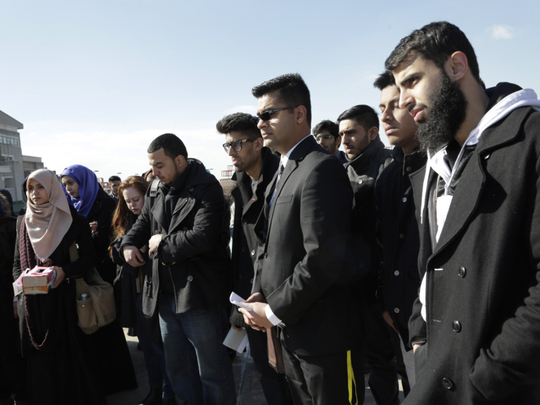
Over the past few weeks, an avalanche of killings and counter-killings has dominated the scene worldwide. The news about killings carried out by Muslim or non-Muslim zealots or other bloodthirsty people has been widely reported in the media.
Charlie Hebdo comes to mind but there is also the recent attack on a cafe in Copenhagen and the brutal killing of 21 Egyptians in Libya. In addition, there is also the killing of three young Muslim students of Arab origin in Chapel Hill, North Carolina, United States.
Extremism seems to fill our political environment. It has nothing to do with religion, as such; it has something to do with people’s perception of others. The killers, Muslims or otherwise, have something else in mind — it may be a social, political or personal experience. These combine to breed hatred between cultures. We must seek the real reasons of these acts.
If we compare all the acts of murder, we can easily drop this idea of referring to the religious beliefs of people. A person may suffer from one mishap or the other, act violently and some others may then find an excuse, putting down his wrong-doing to religion or nationality or even sect or race.
A murder is a murder; it does not matter if it happens in Paris, Copenhagen or North Carolina, and it does not matter if the victim is Muslim or or Christian or atheist. It has to be condemned for what it is, as human life is the same all over. This is how we should treat such incidents.
I followed coverage of the killings on Muslim and Arab channels and on social media. There was frustration about the world’s reaction to the Charlie Hebdo incident when compared to the North Carolina incident as both were coldblooded murders. Even BBC Arabic set aside a half-hour slot, with commentators accusing the media of playing down the killing by saying the motive was linked to a dispute over parking between neighbours. However, people close to the victims’ family said that the killer had no previous run-ins with the victim until he married and his wife — who wore a veil — came to live with him. The ‘fanatic’ suddenly realised that his neighbours were not “one of us” and that they were “one of them”.
Different takes on the same situation
That’s why the killing happened. Politicians quickly jumped the gun. Turkish President Recep Tayyip Erdogan was the first to call US President Barack Obama to say something on the incident, as he had kept silent, contrary to what happened months ago during the Ferguson riots. At that time, Obama immediately gave his condolences to the family of the victim. Others referred to the killing as a hate crime, and accused the media of taking sides. A hashtag emerged, saying if the victims are Muslims, it is an act of lunacy, but if the act is carried out by a Muslim, then it is a case of terrorism.
Others even accused Arab and Muslims governments of a conspiracy of silence. They were accused of not speaking out clearly and loudly against these killings.
What does this whole affair teach us? It is clear that we are all facing an ethics crisis. We treat the same act differently — from bringing the whole world, with their leaders, to Paris to walk hand in hand after an attack to treating another set of killings as insignificant. This kind of behaviour is there to be seen by everyone who watches television or is active on social media.
The world needs a new set of ethics, with the advance of the digital age, probably putting the old ideas of fairness, equality and liberty within a new context. We can’t live in one world and think of the blood of different human beings as being different based on race, religion, colour, place of birth or wealth. We are all equal.
Mohammad AlRumaihi is a professor of political sociology at Kuwait University. You can follow him on Twitter at www.twitter.com/@rumaihi42









